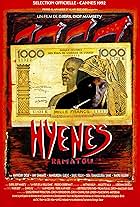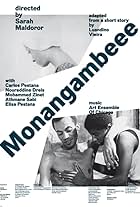Ajouter une intrigue dans votre langueA man is wrongfully arrested and tortured to death after he is suspected of being part of a revolutionary group.A man is wrongfully arrested and tortured to death after he is suspected of being part of a revolutionary group.A man is wrongfully arrested and tortured to death after he is suspected of being part of a revolutionary group.
- Réalisation
- Scénario
- Casting principal
- Récompenses
- 3 victoires et 1 nomination au total
Dino Abelino
- Zito
- (as Adelino Nelumba)
Benoît Moutsila
- Chico
- (as Benoit Moutsila)
Ana Wilson
- Narrator
- (voix)
Avis à la une
Angolan-Congolese film on Portuguese colonial opression, with traits os neorealism, a quite good cinematography and a moving soundtrack.
This is a tragic, personal and political film – set in Angola (shot in Congo), and narrating the struggles and realities of the African Liberation Front. Dominguez, a soldier, a loving husband and a hard-working truck driver is arrested by the Portuguese secret police. What ensues is a story of inhuman cruelty and torture even as frail, oppressed and brave Africans try to resist and break free. The film could not have been shot in Angola, since the country was still fighting for its freedom – and thus the immense impact and significance of this film in 1973 can only be imagined. Both Domingos de Olivieira and Elisa Andrade are fantastic – but the entire cast does its job, be it the kids, the old or the Angolan fighters, also the Whites. Domingos, especially, is shot beautifully and he really comes to symbolize all of Angola's pain and injustice. The message and overall tone is deeply Marxist, with the 'rich' being marked as the enemy, and not the Whites. Angola's economy continues to suffer even today because of this huge divide between the rich and poor – and maybe there were/are reasons, but the vision of this film largely remains unrealized by the country. The quality of my print wasn't good, but the film was an absorbing one and somehow, the yellowish, haggard quality of the rip complemented the film. The film is fiction, yes, such stories are strewn across the history of African liberation, yes – but this cinematic account effectively drives home the helpless situation that many Africans dealt with. And like I said, its impact on Angolans in 1973 can only be imagined – and hence, it is immensely important. Not to take away a shred of credit from the filmmaking though – a great convergence of camera angles, acting and thematic treatment.
Sambizanga is a straightforward and distressing film about one man being wrongfully imprisoned and atrociously mistreated while imprisoned, and his wife continually trying to find out where he's been taken.
It's presented in a very realistic way which only adds to the tension and discomfort. It's a no-nonsense film with a clear message, and it takes a direct approach in making said message clear. I think what it says is important, and mostly like the approach/execution, though it can lead to some slower parts and a bit of repetition (by design, maybe, but still).
I think this is worth seeking out though. It seems pretty obscure, but I think it received a decent number of votes on the latest Sight and Sound poll, and MUBI has a nicely remastered version of it, so it'll hopefully end up on a few more people's radars in time.
It's presented in a very realistic way which only adds to the tension and discomfort. It's a no-nonsense film with a clear message, and it takes a direct approach in making said message clear. I think what it says is important, and mostly like the approach/execution, though it can lead to some slower parts and a bit of repetition (by design, maybe, but still).
I think this is worth seeking out though. It seems pretty obscure, but I think it received a decent number of votes on the latest Sight and Sound poll, and MUBI has a nicely remastered version of it, so it'll hopefully end up on a few more people's radars in time.
Maldoror's vital film was made for practical purposes-to document the struggles of the Angolan War of Independence, and the widespread imprisonment and torture of members of the MPLA, at a time when the war against Portugese colonialists was by no means over. With its cast of non-professionals and its absence of visual flourish, Maldoror's film emerges from and speaks to its circumstances: functional film-making, which doesn't mean a suspension of 'quality' for the contextual, but which makes a strong claim for a mode of cinema that cannot be disentangled from 'context', in which form and function match. The film is neither the exposée of neo-realism nor the humanist of 'poetic realism', but something entirely its own. The scenario is simple, but has its heart the willed obscurity of a colonial regime who lock away and murder those who challenge them in secret: Domingos, an MPLA militant, is abruptly kidnapped by colonial authorities in a horrific dawn raid of the village; his wife Maria walks from prison to prison, and the film follows her journey, and that of a network of clandestine militants who seek to obtain information on Domingos' location while themselves remaining ever-careful to avoid exposure. It's a woman-Maria-and an old man and a young boy-the pair who watch the prison for those who have been secretly deposited there-who form the central points of identification, and while a superficial viewing might suggest that the film reinforces normative gender roles-Maria's entire focus is on her husband, rendering her in that sense secondary to a political struggle figured as male-that would miss the point. Maria's grief and uncertainty is genuine, her task is practical: screaming Domingo's name outside the prison is a practical, political act, as well as a raw welling-up of grief. And the collective network which seeks to aid her, and which can only emerge through mediated forms of communication, the slow process of connection, the discovery of information piece by piece, involves men, women and children, suggests a model of the society that might emerge once the struggle is one, eventually coming into focus in the closing performance of song, a public statement of solidarity and resolve, a joyful memorial for the dead. Made ten years after the events it describes the film is able to close with end titles that note the progress such struggle ensured, even if that struggle has by no means by entirely won. Though Domingos dies, Maria's persistence, along with that of the network of other militants who receive the news of his death, and who will soon go on to storm the prison, suggest qualities of survival and defiance that assume both a personal and a collective level. A luta continua.
Le saviez-vous
- AnecdotesMembers of Movimento Popular de Libertação de Angola (MPLA) and of the Congolese political groups who helped them, took part in the film as actors and extras.
- ConnexionsFeatured in Women Make Film: A New Road Movie Through Cinema (2018)
Meilleurs choix
Connectez-vous pour évaluer et suivre la liste de favoris afin de recevoir des recommandations personnalisées
- How long is Sambizanga?Alimenté par Alexa
Détails
Box-office
- Montant brut mondial
- 263 $US
- Durée1 heure 37 minutes
- Mixage
- Rapport de forme
- 1.37 : 1
Contribuer à cette page
Suggérer une modification ou ajouter du contenu manquant

Lacune principale
By what name was Sambizanga (1972) officially released in India in English?
Répondre


















